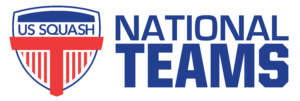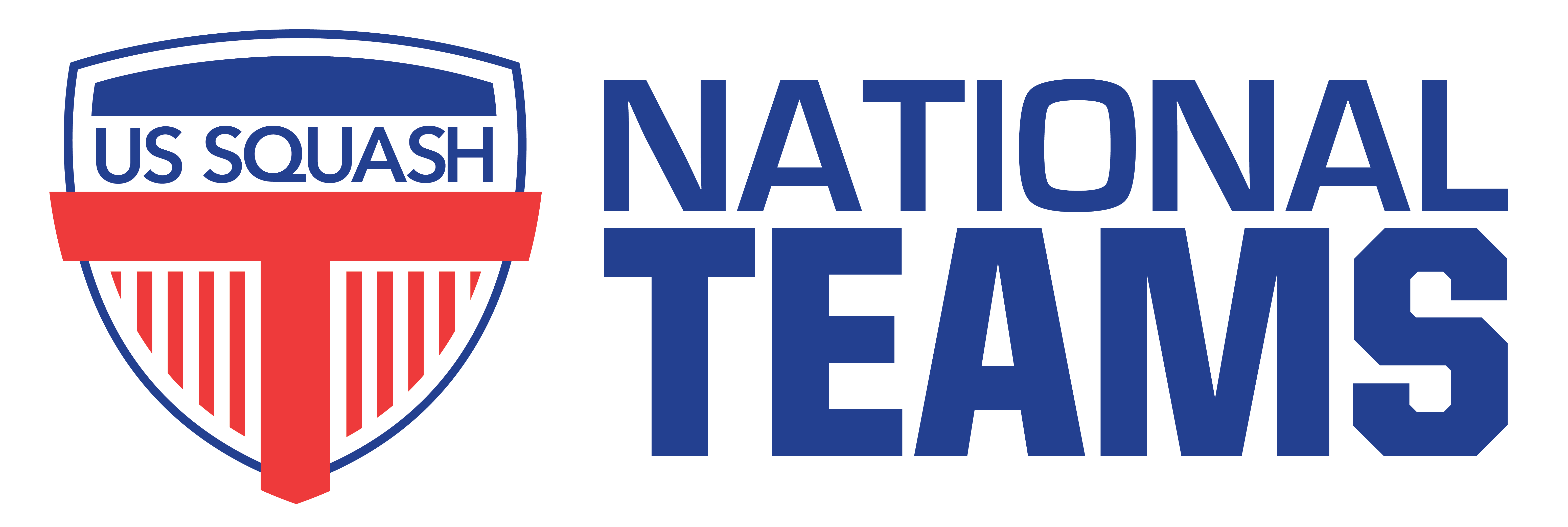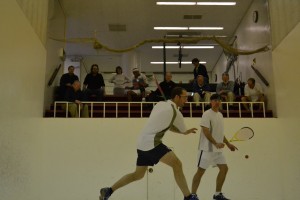Trailing 1-0, 14-12 in his quarterfinal, two games to love in his semifinal and having failed to convert a third-game double-match-ball this afternoon in the final, top-seeded defending champion Preston Quick answered every one of those daunting multi-front challenges and emerged victorious in the 2012 U. S. National Hardball Championships, hosted by the Harvard Club Of New York in midtown Manhattan. Quick thereby retained the title he had won at the Tennis & Racquet Club in Boston a year ago against three-time defending champion Eric Pearson in a close four-game final, and earned the $1500 winner’s share of the $4500 total purse which had been put up for the second consecutive year by the Hardball Committee to induce top professional players to enter (a women’s purse was offered as well, but only one woman entered and the event was therefore not held).
Pearson had entered this year’s tournament and was seeded second but had to pull out on Friday after missing the last flight from his San Francisco home base that would have gotten him to New York in time for his first-round match. Quick’s final-round opponent this year was Sunny Hunt, who nearly won the first game, escaped with the third on a stroke call and stood at 8-all in the fourth, the match seemingly anyone’s to win at that stage, only to yield to a seven-point match-ending Quick surge that completed his 15-13 15-10 15-16 15-8 triumph, a decisive close-out to a highly competitive and compellingly entertaining weekend of squash.
After saving those three second-game game-balls against him Saturday morning against his former Trinity College teammate Duncan Pearson (who had soundly out-played two-time Hardball Nationals finalist Rob Dinerman in the round-of-16, and who tinned a forehand reverse-corner attempt on his no-set call against Quick at 14-all) en route to a four-game win, Quick faced Eric Christiansen, three-love quarters winner over five-time champion Tom Harrity, against whom Christiansen had taken the second game in a tiebreaker and finished off the third with a perfect backhand three-wall nick at 14-12. A series of early-game errors put Christiansen in a 7-2 hole in the opening stanza, but he then out-scored Quick 13-4 to take the first game, led throughout the second and throughout the best-of-nine tiebreaker, which Quick managed to get to 4-all, simultaneous-match-ball before crushing a backhand rail that rang loudly off the tin. To his credit, Quick rebounded from this potentially costly error, raising his level significantly in jumping out to sizable early leads in each of the last three games (including 4-0 and 9-3 in the fifth), ultimately prevailing by an 11-15 17-18 15-7 15-10 15-7 tally for a hard-earned ticket to the final.
Waiting for him there was the aforementioned Australian-born Hunt, the head pro of the Philadelphia Cricket Club, who in a total of five tournament hardball matches to that stage (the three it took for him to win the William White event at the Merion Cricket Club last month and the two, against Harrison Sebring and Chris Walker, this weekend) had yet to lose a single game. He barely lost the first game of the final, climbing from a mid-game deficit to get to 13-14 before Quick laced a backhand rail that died right at the back wall. Hunt then hit a tinny patch in the second, falling behind 6-2 and never really threatening from there — but he charged to a 13-8 lead in the third. Quick then ran off six straight points, three of them on unreturned hard serves from the right box, eventually leading 2-1 in the best-of-five overtime session before Hunt surprised Quick with a severe backhand drive and collected that stroke call when Quick hit a backhand right back at himself just left of center-court. The fourth game seesawed erratically through 16 equally divided points, at which crossroads juncture Hunt’s intensity level dipped just a little, enough for a combination of low Quick drives (including a beauty laced down the right wall at championship-point) and a few unforced tins off Hunt’s racquet accounted for that 7-0 calling-card conclusion.
There were a total of 45 players competing in seven different categories. Harrity (in the 40-and-over flight), John Winchester (in the 50’s), Palmer Page (in the 60’s), Lucky Young (in the 70’s) and Charlie Butt (in the 75’s) all prevailed in their respective round-robins, in most of those cases with the last match effectively constituting a final, since it pitted the two players who had gone undefeated to that point. Harrity won over Alex Dean in four games, as did Young against Marmor, reversing last year’s result between these two long-time rivals. Winchester swept through his five-player bracket without coming close to losing a game, and so did Page, who rose superior to William White 60’s winner Paul Chan with a trio of 15-10 scores. In the 65’s, the only age-group event to have a large enough turnout (10 players) for a full draw instead of a round-robin, Henry Steinglass survived a murderous (15-13 11-15 15-13 13-13 15-13) semifinal against Eric Berger to qualify for the final, where he was barely nosed out in each of his three-games with Tefft Smith, who eked out the first two games 15-12, 15-13, then trailed 4-3, set-five in the third-game tiebreaker before getting the serve back on a forehand reverse-corner and muscling a hard serve that angled too sharply off the back wall for Steinglass to steer it back into play.
The tournament as a whole had some wondrous elements to it, most notably the extraordinary quality of the Open division, as witness how hard-pressed Quick, a top-tier ISDA doubles star and a two-time S. L. Green softball-singles champion, was right from his opening match, as well as the semifinal exit, in straight games no less, of the former British Open finalist Walker, another top player on the ISDA circuit. The Hardball Committee has in recent years shown remarkable resiliency, resourcefulness and creativity in keeping the hardball game alive and vibrant, and this level of commitment and dedication can clearly be counted on to continue as this hardy band of aficionados looks forward to the 2012-13 season.
This article appears courtesy of Dailysquashreport.com.
For complete results, please click here.



